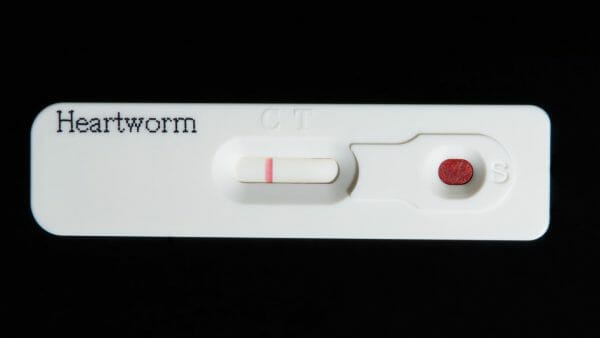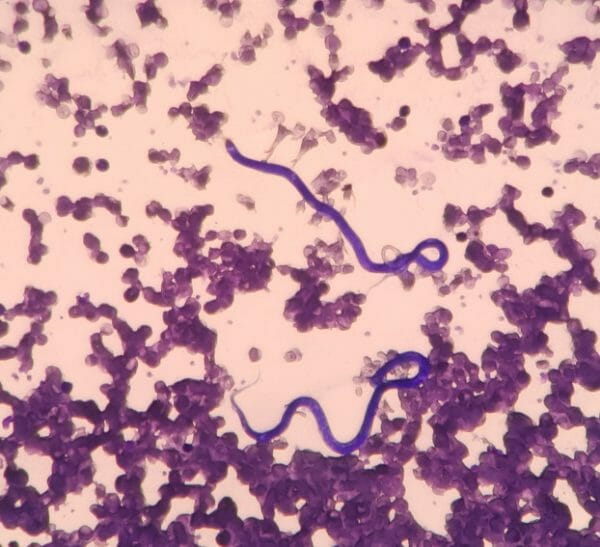Symptoms of Heartworm in Cats
Within the feline population, an infestation of heartworms is relatively uncommon. However, if one of these parasites does infiltrate the cat’s bloodstream via a mosquito bite, it can be difficult to detect. At times, the symptoms can go undetected for long periods of time and then manifest all at once.
If the symptoms come all at once, it usually does not bode well for the cat. These symptoms, severe in nature, tend to signal an emergency. This can happen when the worms create a blockage in the arteries—cutting off blood flow to the lungs. In cases like this, the cat may suddenly collapse or die.
Signs
Here are the symptoms associated with heartworms in cats:
- Respiratory problems such as labored or rapid breathing, coughing attacks, or respiratory failure (extreme cases)
- Weight loss
- Vomiting
- Cardiac issues, such as possible heart murmurs
- Fainting
- Decreased energy
For felines dealing primarily with respiratory problems, this condition is known as heartworm-associated respiratory disease (HARD). This is due to dead worms blocking vital airways or arteries. It should be kept in mind that many of these symptoms are common in other health problems, such as cancer or feline immunodeficiency virus (FIV). This is one reason why it can be nearly impossible to detect these parasites. Unless the heartworms are stumbled upon by accident through diagnostic testing, many felines go untreated and may collapse unexpectedly.

What Is Heartworm?
Dirofilaria immitis, otherwise known as heartworms, are microscopic parasites that can enter into a body through a mosquito bite. Once the worms are deposited into the feline’s blood, it begins its lifecycle, which can take up to half a year to complete. Although these parasites rarely reach adulthood in felines, those that do can survive up to 3 years within the cat’s body.
Heartworm: Cats versus Dogs
Though heartworms are significantly less common in cats than dogs, this does not mean it is any less problematic. This is mainly due to the fact that many forms of the medication that work for dogs with heartworm disease do not work as effectively on felines.
Things are also different when it comes to the worm’s lifecycle. For felines, the worms do not develop fully into adults as they do in dogs. This is because cats possess a strong immunity to heartworms, with only 10% of worms reaching adulthood. Although this can be good, immature heartworms and dead heartworms can still do tremendous damage to the animal internally. Even more, while dogs can have dozens if not hundreds of worms living inside them, felines only have between three or six.

Is There a Heartworm Test?
There are heartworm screening tests available to cats. Vets strongly recommend that, along with monthly preventative medication, the cat should be tested for the worms once per year. In felines, this disease can develop quickly. In many cases, an owner will be blindsided by a diagnosis of an advanced case of heartworms in their feline. Because there are usually no preceding signs of the heartworms infesting the feline, these yearly tests can greatly help in catching it before irreversible damage is done.
Are Heartworms Contagious to Humans and Other Pets?
The only way for a human or a pet to contract heartworms is through an infected mosquito’s bite. If a feline has been diagnosed with the parasites, there is no way for others living with it to get it as well.
Can Indoor Cats Get Heartworm?
Indoor cats can get heartworms. In fact, one-third of all felines diagnosed with these parasites are indoor-only cats. Mosquitos can easily fly inside a home, so indoor cats are not exempt from this disease. This reinforces the need for all cats, indoor and outdoor, to receive preventative heartworm medication year-round.

Is There A Vaccine for Heartworm?
Although effective vaccines are currently unavailable for these parasitic manifestations, there are viable preventative measures that can work well to keep the possibility of a heartworm diagnosis to a minimum.
Treatment and Prevention of Heartworms
A cat that receives a diagnosis of heartworms may have a rough road ahead of it. In some rare cases, the cat may have a strong enough immune system to fight them off. However, in cats with weaker immunity, there are very limited options for treatment. As of this time, there is no go-to treatment method for felines with heartworms. There are some medications to help stabilize the cat and reduce the severity of its symptoms, but these are risky at best.
The vet will most likely run tests such as antibody measurements, blood tests, and X-rays throughout treatment to see if any significant damage is being done by the heartworms. Because treatment can be complicated, the cat’s vet may try to focus efforts on making sure the cat is comfortable and pain-free. In many cases, the cat may be doing better and then inexplicably take a turn for the worse.

Preventative Measures
It is absolutely crucial for a cat to be consistently receive preventative heartworm medication every month beginning around 8 weeks old. This may nearly eliminate its chances of contracting the parasite during its lifetime. Heartworm medications for cats are available from the vet or from a pet supply site such as Chewy.com.
Because the preventative medication is based on weight, the cat will need to be seen at least once per year to make sure the dosage is accurate. These medications may be administered orally, topically, or injected into the skin.
As an essential aspect of prevention, the cat should also be tested every year to make sure there are no traces of these parasites in their system. While the cat’s chances of having these worms are slim, there is still a minute possibility.
Can You Get Rid of Heartworm Completely?
It is possible for heartworm to go away completely in cats. However, this usually only happens in healthy felines with a strong immune system. In other cats, it can take up to two years for all traces of the heartworms to go away. Within that time, many felines do not survive.
By the time the disease is diagnosed, the heartworms have usually done considerable, often permanent, damage to the cat internally. As mentioned before, treatment measures and surgical procedures to physically remove the worms are extremely risky. This is why it is nearly impossible to predict life expectancy of felines with heartworms. Some felines fare better than others and may live many years with the disease, while others cats endure severe symptoms and a shortened lifespan.
Living and Management
For felines diagnosed with these parasites, the cat will need to be seen every few months by the vet to keep up on its progress with the disease. As mentioned previously, the vet will aim to treat the symptoms more so than the disease itself due to its delicate nature.
Tests will be continually done to determine if any irreparable damage has been done to the felines’s organs. Some cats sustain life-long damage to their respiratory system because this is where the worms tend to live. Overall, keeping the cat comfortable and happy is just as important as taking it to the vet whenever is required.




